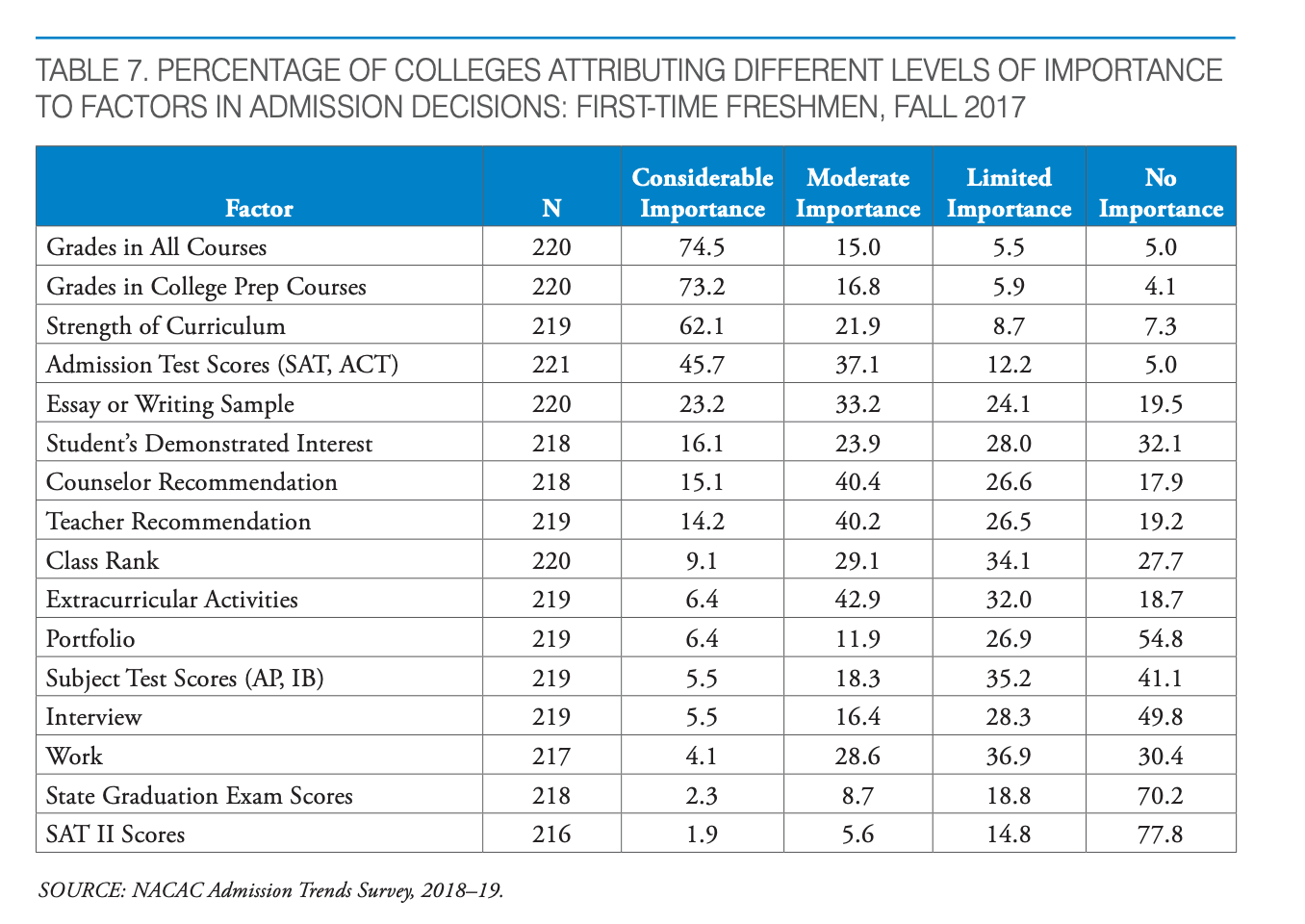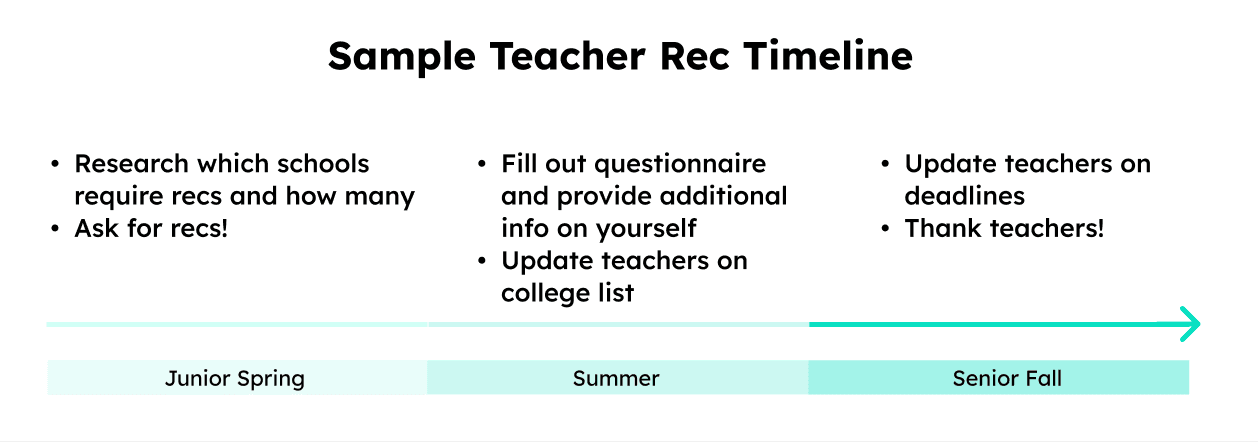The Complete Guide to Requesting Letters of Recommendation
9 minute read
Recommendation letters for undergraduate college admissions are extremely important for your applications, yet can be daunting and a hard-to-navigate process. I’ve been in the position of asking some of my high school teachers for recommendations and know how nerve-wracking it can be. I also made some mistakes along the way that I’ll be sure to point out throughout this article.
Why Are Recommendation Letters Important?
Recommendation letters can really help you stand out in the application process. They can help colleges get to know more about who you are — your personality traits and how well-rounded you might be — which is invaluable in making informed admissions decisions.
Do your own research through Polygence!
Polygence pairs you with an expert mentor in your area of passion. Together, you work to create a high quality research project that is uniquely your own.
According to the 2017 NACAC “State of College Admission” survey, teacher and counselor recommendations are almost as important as essays or writing samples for college admissions. To provide some context, the numbers in each of the columns from “Considerable Importance” to “No Importance” represent the percentage of colleges in the survey that rated that Factor as “Considerable Importance,” “Moderate Importance,” “Limited Importance,” or “No Importance.” The column that says “N” represents the total number of colleges that participated in rating that particular factor.
So when combining the percentages for “Considerable Importance” and “Moderate Importance,” counselor and teacher recommendations are almost just as important as Essay or Writing Sample.

Further, as shown in the table above, there are two types of recommendation letters. There are counselor recommendations and then there are teacher recommendations.
How To Get Started with The Counselor Recommendation
High school counselor recommendations often fly under the radar compared to teacher recommendations, but you definitely shouldn’t ignore the importance of a great counselor rec.
Counselor recs will typically give admissions a sense of the school environment that the high school student is coming from. This is very important as high schools can vary drastically in terms of resources and offerings.
I made the mistake of believing that the counselor recommendation was useless, as I thought it was essentially the same recommendation given to all students, providing context on my high school. The truth is that the counselor rec can really give you a boost if you take the time to meet with your counselor on a regular basis, allowing them to also get to know you better. The more a counselor knows you, the more that they can write about you in their letter. If you were someone like me, who only popped into my counselor’s office when it was required, then my counselor had no chance to get to know me, making my counselor rec very generic as a result.
You can reach out to your guidance counselor and simply ask to set up a recurring meeting to talk about school, career, or college. For these conversations, feel free to ask for advice about what’s top of mind for you, and also provide updates on how you’re doing in school or how you’re thinking about your future. If all goes well, you not only will have a mentor to help you succeed in high school, but also a mentor who can write a glowing recommendation for you to enter college. Further, the earlier you start the relationship the better. This will allow the guidance counselor to see your growth and journey throughout high school, which can allow them to write a stronger rec. For example, the Common App counselor recommendation form includes questions like “[What are] the first words that come to mind to describe the student.” By building a relationship with your counselor, you make it easy and natural for your counselor to answer that question.
Your Project Your Schedule - Your Admissions Edge!
Register to get paired with one of our expert mentors and to get started on exploring your passions today! And give yourself the edge you need to move forward!
How To Get Started with Teacher Recommendations
First, look through your list of schools that you’re interested in, and research which schools require teacher letters of recommendation. Some may require none, and others may require two or even three. Some may also require teacher recs in specific subject areas so be on the lookout for that.
Choose Your Recommenders Wisely
When it comes to deciding whom you’re going to ask to write your recs, there are several factors to consider. First, you ideally want a teacher who likes you and knows you well, and can speak to your abilities and great qualities. Maybe you did especially well in their class and participated a lot, or maybe you didn’t do particularly well but you still developed a great relationship with the teacher and worked hard. I’ve had high school friends who asked teachers for recs where the teacher did not have a favorable opinion of them. You can imagine how awkward those conversations went. Yikes.
It’s also easier for a teacher to write your rec if they taught you recently. If you’re a current junior, think of targeting teachers who taught you in junior year, or sophomore year if you think you made a particularly great impression. It’s just easier for a teacher to write a rec when a student is fresher in their memory.
Finally, prioritize teachers who teach core subject areas (social studies, math, science, English) over elective teachers (art, music, cooking), unless you’re looking to apply to something like an art school or music school. Colleges typically want to know how you’re doing in core academic areas. Obviously, if a college requires two teacher recs you can then feel free to utilize a rec from a teacher in a core subject area and a rec from an elective area. This can highlight the different strengths that you can bring to college.
I didn’t do such a great job of building relationships with my teachers. I was so heads-down in trying to get the best grades that I often didn’t take the time to get to know my teachers (you can read more about my story in high school). My recommendation, especially if you’re a current sophomore or junior, is to make an active effort to build relationships with your teachers. It doesn’t require you to be a kiss-up or do anything crazy - working hard in class and participating daily will set you up for success. I’ve even heard from teachers that greeting them when you enter class and wishing them a great day when you leave can make a lasting impression (now the secret’s out).
Ask For Your Letters of Recommendation Early
Teachers are very busy people and their life becomes even more hectic when college app season comes around. Once you know which teachers you’ve made a great impression on and are a great fit to write your rec, ask them as soon as possible. I would recommend asking in the spring of junior year and definitely at least two months before your first college app is due. This will give your teachers ample time to write effective letters and is a sign that you respect their busy schedules.
Further, in my high school, I knew some teachers who were very popular with students would often limit the number of recs that they would do per year to ensure that they were all high-quality letters. If you suspect that your teacher might be a recommendation letter celebrity, then all the more reason to ask early.
How to Ask For Your Letters of Recommendation
It can seem a bit scary at first to ask your teacher for something, but remember that if you’ve built a great relationship with your teacher then they should be more than happy to help you out. You can approach asking for your rec in one of two ways:
Schedule a quick meeting with them in advance. You can shoot them an email asking if they have five minutes to chat about college.
Talk to them after class. And after all your fellow classmates have left.
Here’s an example conversation of how you might ask for your rec:
You: Hey, Ms. Smith! Do you have a few minutes to chat?
Ms. Smith: Sure, Alex. What's up?
You: I'm going to be applying to colleges in the fall and I'd really appreciate it if you wrote me a strong letter of recommendation. Would that be something you're willing to do?
Ms. Smith: Of course! Happy to do it.
You: Thank you so much! I’ll be sure to send over my list of colleges that I’m looking to apply to and their deadlines over the next few weeks. Is there anything else that you need from me right now?
Ms. Smith: Nope! You should be good for now.
Make It Easy For Your Teacher To Help You
After you ask for your rec, your job is not done. It’s important in general to keep your teachers in the loop about what schools you’re applying to and what are the deadlines for those schools. Furthermore, you should also look to provide your teacher info about what you want to them to highlight about you and your achievements. You may be thinking, “Well, my teacher knows me well so they should be just fine on their own writing my rec.” That may be true, but how do you know that your teacher is highlighting the right things to admissions offices?
A great way to help your teacher highlight the right things is by filling out a questionnaire like this one. Your teacher will love you for this as it makes it a million times easier to write the rec. My high school even required us to answer certain questions to help our teachers write their letters. You can also send over your resume to your teacher as well to provide them with additional context about any passion projects that you’ve done. Teachers may also have their own timelines for when they want info sent to them, so be sure to double-check with them and respect their deadlines.
As you begin to approach application deadlines, be sure to send follow-up emails to your teachers if you have any updates on the schools that you’re applying to. In all of your communications with your teacher, be sure to express your gratitude. Teacher recs are a time-consuming task on top of a teacher’s core teaching responsibilities, so be sure to end emails with phrases like “Again, thank you so much for your help in this process.” Also, if you are still taking the teacher’s class be sure to keep up the good work, and if you’re no longer in that teacher’s class make an effort to say hi in person every so often.
And of course, after all your college apps and letters of recommendation are submitted, be sure to thank your teacher one more time and perhaps even give them a thank you card or a small gift. It will go a long way in ensuring that your relationship continues even after you graduate high school!
Asking Mentors for a Letter of Recommendation
Another person you should consider asking for a recommendation letter is a mentor who works within the field that you are interested in studying. This helps create a theme throughout your application that shows you are passionate about that field and shows admissions you are proactive about enriching yourself outside of school.
While finding mentors takes more effort, they will be excited to connect over your shared passion and help you get started in their field. Research programs like Polygence connect you with a mentor that is an expert in the topic you are passionate about and the platform to build a relationship.
Just as with a teacher, make sure you ask your mentor for a recommendation letter with ample time before deadline and that they are aware of deadlines for each school.
Sample Timeline
Here’s a basic sample timeline of how to manage the teacher rec process!

Want to start a project of your own?
Click below to get matched with one of our expert mentors who can help take your project off the ground!
